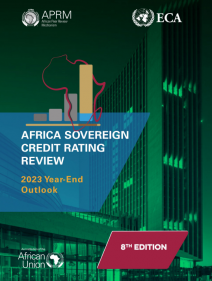The trend of negative sovereign credit ratings continued to dominate in the 2023H2 due to the growing fiscal pressure in a few African countries coupled with concerns over the ‘wall of Eurobond maturities’ in 2024. The continent faces a period of huge principal maturities, peaking in this year, as investors are expecting to redeem a combined estimate of US$11.3 billion in outstanding Eurobonds. As part of its Research and Advisory function, the APRM has severally pointed out the material weaknesses in the Environmental, Social and Governance (ESG) rating criteria which include subjectivity, inconsistencies, and lack of transparency. In a positive development, S&P Global Ratings announced its decision to drop ESG scores from its debt ratings, which signals a recognition of the challenges and limitations of subjectivity, the lack of standardized measurement in methodologies associated with these metrics as noted in previous editions of this report. This report analyses the long-term foreign currency sovereign credit rating actions in Africa by the three dominant international credit rating agencies (CRAs) – Moody’s Investors Service, Fitch Ratings and S&P Global (S&P) Ratings – during the second half of 2023 (2023H2) and makes recommendations to both CRAs and African governments on how credit ratings can be improved.
Share this:
Release Date:
2 février, 2024
© United Nations Economic Commission for Africa

